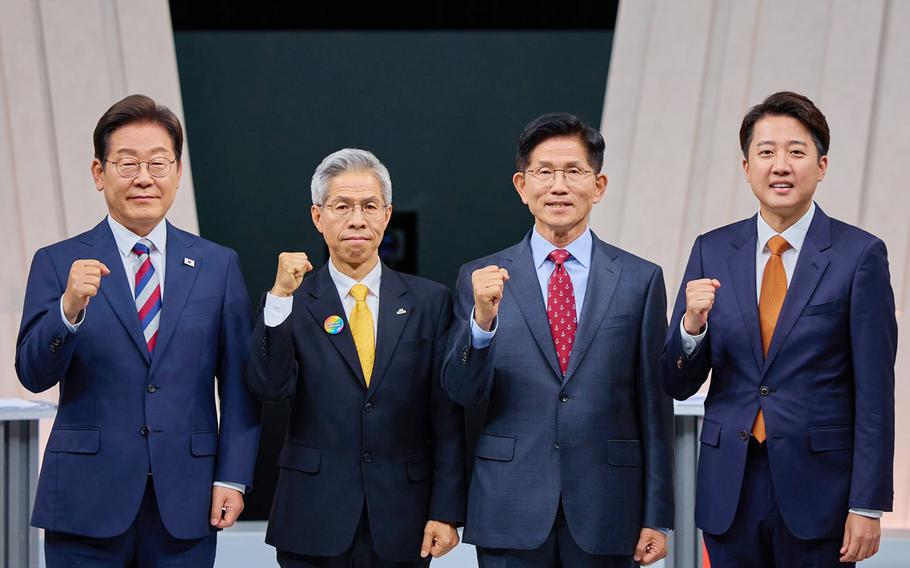
South Korean presidential candidates, from left, Lee Jae-myung of the Democratic Party; Kwon Young-kook of the Democratic Labor Party; Kim Moon-soo of the People Power Party; and Lee Jun-seok of the New Reform Party pose after their televised debate on May 27, 2025. (Lee Jae-myung)
South Korea’s top presidential candidates offered differing approaches to President Donald Trump’s demands on defense cost-sharing during their final televised debate ahead of next week’s election.
The two-hour debate Tuesday in Seoul featured Lee Jae-myung of the liberal Democratic Party; Kim Moon-soo of the conservative People Power Party; Kwon Young-kook of the progressive Democratic Labor Party; and Lee Jun-seok of the neo-conservative New Reform Party.
The candidates were given a chance to question one another on topics of their choice, with 30 seconds allotted for responses and rebuttals.
Kwon pressed Kim on whether he would agree to Trump’s calls for South Korea to pay more for U.S. military support.
“If Trump asks for an increase, can you accept it?” he asked.
Kim said it was possible for Seoul to boost its contribution and offset the cost by having South Korean companies help build U.S. submarines.
South Korean defense firm Hanwha Ocean completed its first major repair service of an American naval vessel, the dry cargo ship USNS Wally Schirra, for an unspecified amount in March.
Trump has repeatedly criticized Seoul for what he considers insufficient contributions toward the 28,500 American troops stationed in South Korea. They help deter threats from North Korea.
Under the cost-sharing agreement signed in November during President Joe Biden’s administration, South Korea will pay $1.2 billion annually beginning in 2026.
Kim said he would work to assure Trump that the U.S.-South Korea alliance is rooted in shared strategic interests.
“I will certainly give [Trump] the assurance about various contributions we can offer each other, beyond receiving some chump change,” he said.
Lee Jun-seok, a Harvard-educated former leader of South Korea’s main conservative party, offered a similar view on defense funding.
Rather than directly increasing Seoul’s financial contribution, he proposed the establishment of a joint logistics facility to manufacture artillery shells for the U.S. stockpile.
The U.S. has struggled to replenish munitions due to weapons shipments to Ukraine. Then-National Security Adviser Jake Sullivan said in December that Ukraine used a year’s worth of 155 mm shells produced by the U.S. during the first eight weeks of the war.
A Realmeter roll of 1,003 eligible voters conducted over two days starting Monday showed Lee Jae-myung leading with 49.2% support, followed by Kim with 36.8%, Lee Jun-seok with 10.3%, and Kwon with 0.7%. The poll had a margin of error of 3.1 percentage points.